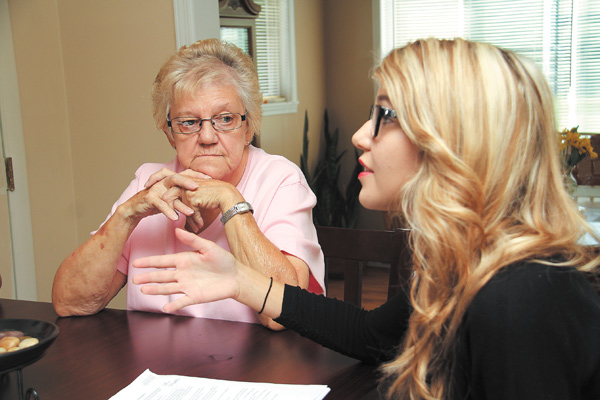Geneva Peck of Austintown treated for stage 1 lung cancer


Geneva Peck, left, of Austintown, listens to her granddaughter, Sammantha Bonacci, talk about what it was like watching Peck go through cancer treatments.
AUSTINTOWN
Geneva Peck’s health didn’t provide her many options for her cancer treatment.
She did, however, choose the relatively new stereotactic body radiation therapy when stage 1 cancer was found on the lower lobe of her right lung during a routine six-month check-up for her chronic obstructive pulmonary disease.
Surgery was not an option because it would have decreased lung capacity in her lung already damaged by COPD, doctors at the Cleveland Clinic told her.
As a result, Peck became the Cleveland Clinics’ 1,000th stereo-tactic body radiation therapy patient, a treatment option she said she wants to share with others.
“As we’ve been going through this journey and telling people about the radiation, we found so many people who have no idea this treatment exists, and how it can change their lives as it has for my family,” said Sammantha Bonacci, Peck’s granddaughter and a sophomore at Youngstown State University.
Stereotactic body radiation therapy, or SBRT, uses precise patient positioning and multiple radiation beams to deliver fewer but much higher and more precise doses than traditional radiation while limiting damage to areas surrounding the cancer, according to Cleveland Clinic literature.
Peck said part of the SBRT preparation was getting fitted with a large plastic bag filled with tiny foam balls, similar to a bean bag, on which she laid.
A cellophane wrap is placed on top of the her, and then the air was removed from the bag creating a vacuum to keep her body still during the procedure.
Peck had three radiation treatments within two weeks in January, and received good news in April when a computerized tomography scan showed the spot had shrunk by 50 percent.
And, she said happily, her only side effect was temporary weakness, and it didn’t interfere with her life.
Also, doctors told Peck that SBRT has the same success rate as surgery, Sammantha said.
Surgery for patients with stage I non-small cell lung cancer is typically associated with survival rates of 60 percent to 70 percent after five years, and as high as 80 percent, according to the clinic.
Peck, however, received some troubling news from her Aug. 5 follow-up examination.
She said the spot on her lung had not grown, but two “suspicious” lymph nodes were found.
At her next examination, she will undergo a positron emission tomography scan to examine the lymph nodes more closely.
A PET scan uses radiation, or nuclear medicine imaging, to produce 3-D, color images to help find abnormalities, according to the Internet’s “Medical News Today.”
“We’ll get a diagnosis on the lymph nodes at mom’s next examination,” said Michelle Bonacci, Peck’s daughter.
“Its scarier this time. We were all crying,” she said.
Peck said she hopes it is nothing for which she has to have a biopsy.
“I just have to keep thinking the best,” Peck said.
Family has always been central to Peck’s life since she was a child and her support system going through the cancer treatment.
Her mother, Frances Hankey, died of stomach cancer at 36, leaving Geneva, the oldest child, to help her father, William, raise her three brothers and three sisters.
Peck, who grew up on Rigby Street on Youngstown’s East Side, has three children, Michelle, Gary Peck and Dale Peck Jr., all of Austintown, and Richard Peck of Canton; six grandchildren and two great-grandchildren.
“I went from raising my brothers and sisters to raising kids to raising grandchildren. One of my friends said I was born to raise kids,” Peck said with a laugh.
“She’s my angel,” Sammantha said of her grandmother.
Family members light a candle for Peck at Immaculate Heart of Mary Catholic Church and pray to St. Peregrine, patron saint of healing for those suffering with cancer, before she goes for each treatment or examination.
“I couldn’t have a better family,” Peck said.
 43
43
